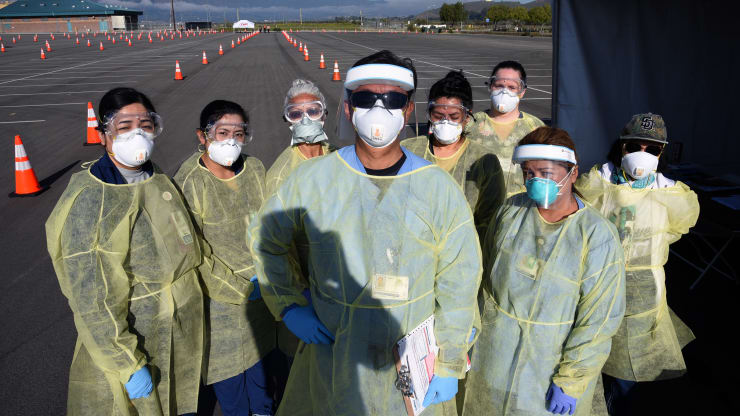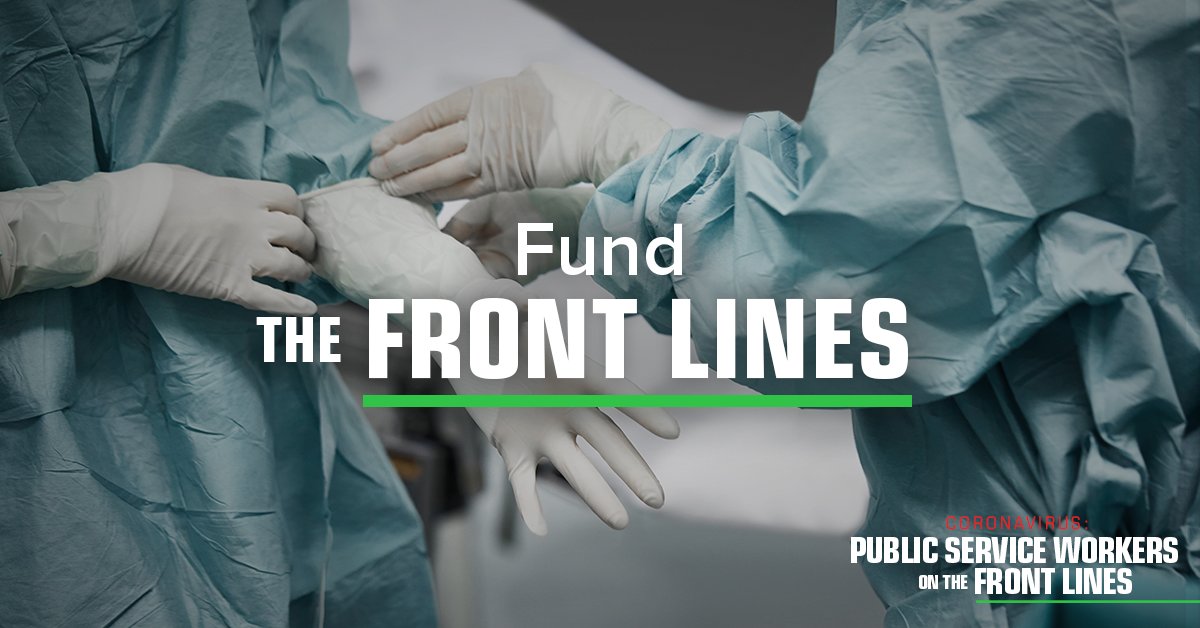
Coronavirus and front-line workers: ‘If they are required to work, they must be kept safe’
Editor’s note: The Coalition on Human Needs recently asked our online supporters how coronavirus has affected their families. Hundreds wrote in to share their stories. This is one of a continuing series of stories about the personal effects of the pandemic – and what must be done to help people in need. If you have a coronavirus story you would like to share, please click here.
If you examine the difference between the current crisis and previous crises our nation has faced – such as the Great Recession of 2008 – one thing that stands out the most is fear for our personal safety.
Not just the fear of personally contracting the virus – although there is certainly that – but also deep-rooted fears that loved ones might get sick because they are not properly protected at work.
Like many who shared their stories with CHN, Andree of California has a loved one who works in a hospital. “My daughter is an oncology RN and they are reusing masks and the gloves they have are too big,” she says. “My husband is in the hospital right now and will need chemo for 6-8 months. We have been quarantined now for a month and have food delivered. Trying to stay calm.”
Pam, an out-of-work massage therapist in Naples, Florida, says she faces economic devastation. “But even more important is the health of my 90-year-old mother and that of my brother who works in a nursing home, and his children who work in grocery stores without protection – no masks or gloves,” she said. “I agree certain businesses need to remain open, but those workers are exposing themselves daily to COVID-19, which could cause not only extreme illness, but possibly death and the exposure of their families. They MUST be provided PPE (personal protective equipment)! If they are required to work, they must be kept safe.”

Medical personnel in PPE from Riverside (CA) University Health Systems hospitals administer a drive-through COVID-19 testing site in the parking lot of Diamond Stadium, March 22, 2020. Photo Credit: Bob Riha Jr/ Getty Images
Lisa-May of Beaufort, South Carolina, had just begun working for the U.S. Census Bureau, but her job was shut down. “Now I am back to working for a company that supports big retail,” she says. “My job is to disinfect areas customers access frequently, without protective gear other than gloves and products not recognized by the EPA to actually kill the virus.”
She says if she gets sick, she plans to die at home because she does not want her life insurance benefits to pay for hospital expenses. “I have to leave my family something,” she says.
Mark of Pacific Grove, California, says he’s worried about two of his children. “My eldest daughter lost her job as a child visitation supervisor, but she stays away to avoid infecting me and the rest of us in case she got contaminated (still no tests for the public!),” he says. “My son works a couple of days at the local grocery butcher shop and we worry about him getting contaminated there.”
Zack of McKinney, Texas, reports: “My work hours have been reduced, but my wife’s job is doing NOTHING to protect their employees, and it’s gotten so bad that she’s had to take unpaid time off just to compose herself and keep from snapping at either her stupid bosses or customers and losing her job.”
Late last week, the National Employment Law Project issued an action alert calling on the U.S. Occupational Safety and Health Administration (OSHA) to issue an Emergency Temporary Standard that would protect health care workers and emergency responders and other front-line workers, including grocery, delivery, warehouse, factory, home care, transportation, and sanitation workers.
The NELP alert could not have been more timely; a Trader Joe’s worker in Scarsdale, N.Y. a greeter at a Giant store in Largo, MD, and two Walmart employees from the same store in suburban Chicago have died in recent days, according to a story published in the Washington Post on Monday. And dozens and dozens of grocery workers across the U.S. have contracted the virus.
Deborah Berkowitz directs NELP’s Worker Health and Safety Program. She helped develop a “rights and resources” toolkit for NELP that was released this week.

A central problem, Berkowitz writes, is that OSHA – the federal agency in charge of worker safety and health in the U.S. — is falling down on the job. First, she said OSHA has not issued any enforceable COVID-19-specific requirements on practices and policies that employers must implement to protect workers. And second, it is not conducting on-site inspections or enforcement, even when workers reach out to the agency with pleas for help to get their employer to keep them safe.
“Worker health is in crisis in this pandemic,” Berkowitz says. “(OSHA) is failing in its responsibility to assure that employers keep workers safe on the job during the pandemic.”
Another problem: OSHA and the Centers for Disease Control have issued voluntary guidelines to keep workers safe. “These guidelines, however, are just that – they are advisory to employers,” Berkowitz writes. “Employers can choose to follow them or ignore them. OSHA has made it clear it is not enforcing these guidelines.”
Berkowitz says workers and their advocates should turn to state policymakers to turn the federal agencies’ guidance into state-enforced requirements – but that may be of little solace to workers on the front lines who are at risk right now.
And there might be emerging evidence that OSHA’s inaction could have a disproportionate impact on people of color, particularly African Americans. On Tuesday, CNN reported that 33 percent of COVID-19 cases and 40 percent of fatalities in Michigan involved African-Americans; on the same day, the Washington Post reported that African American neighborhoods in Chicago were being particularly ravaged by the virus. Similar demographic patterns are emerging in New Orleans, New York City, and Milwaukee.
“Black and indigenous workers and people of color, including immigrants in tenuous job situations, are at increased risk,” Berkowitz writes. “So are temp workers, workers in low-wage jobs, retail and service workers, airport workers, maintenance workers, home care workers, meat and poultry processing workers, and workers in the informal economy. Pre-existing racial health disparities only exacerbate the situation.”


